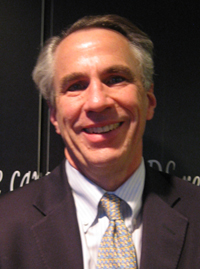ARCHE Researchers Prove the Value of Collaboration

Dr. Robert Siciliano |
February 14, 2011— Two researchers funded by the amfAR Research Consortium on HIV Eradication—ARCHE—have demonstrated the benefits of bringing scientists together in a collaborative approach to cure-focused research.
Robert Siliciano, M.D., Ph.D., of Johns Hopkins, received an ARCHE grant last May to conduct a test-tube search for compounds with properties suggesting they might be able to help cure HIV. He restriced his search to compounds that are already approved by the FDA and therefore don’t need to go through the onerous, costly, and lengthy process of establishing safety in humans.
Meanwhile, Steven Deeks, M.D., of the University of California, San Francisco, was also funded in the inaugural round of ARCHE awards to study immune system phenomena in patients with HIV. Dr. Deeks is a practicing AIDS physician who is also involved in tracking large groups of patients with HIV in clinical trial cohorts.
amfAR recognized the potential for these two researchers to work together and during the first ARCHE meeting, held in June 2010, Drs. Siliciano and Deeks began planning a small clinical trial in which a promising drug candidate identified by Dr. Siliciano could be tested in the clinical trial patients to whom Dr. Deeks had access.
In short order the two researchers wrote up a protocol for such an experiment and ran the plans through the appropriate channels to garner approval for a small trial to determine whether the drug has the potential to speed the clearance of HIV from the body of an HIV-infected person.
At the end of January the new trial began recruiting patients. Ten patients at the San Francisco site and ten patients at the Johns Hopkins site will be recruited to determine whether disulfiram, marketed as Antabuse, might serve as a “new approach to try and force HIV out of its protected cellular reservoirs,” as the trial’s description says.
“Theoretically,” the description explains, “disulfiram will force HIV to replicate (grow) and thus result in the death of the infected cell. Standard antiretroviral drugs should prevent new cells from becoming infected. The end result of this process is that the total amount of HIV in the body will decline over time.” Drs. Siliciano and Deeks warn that patients under treatment for HIV should not try this at home—the study is in its earliest stages and no data are available establishing either harm or benefit.